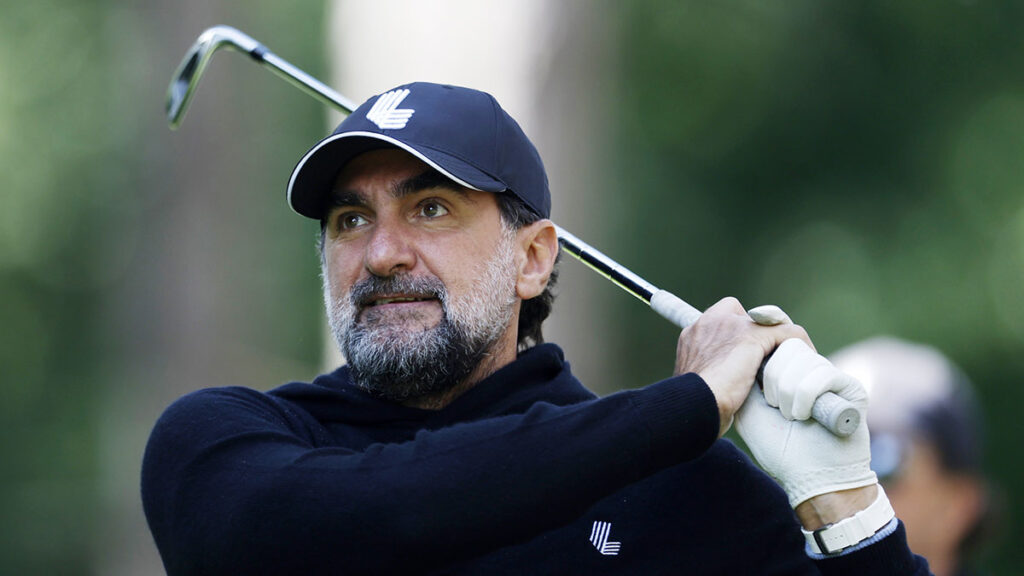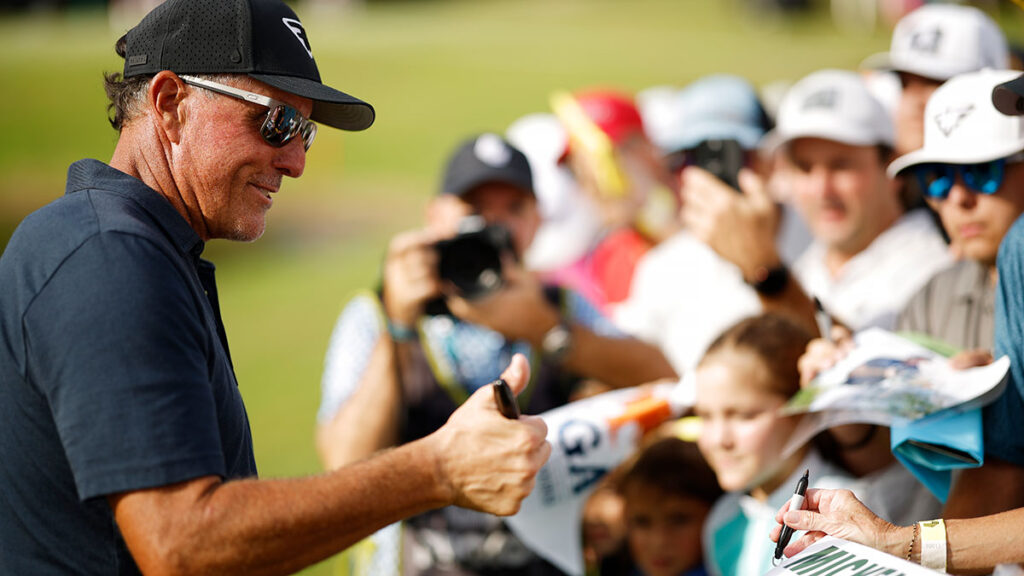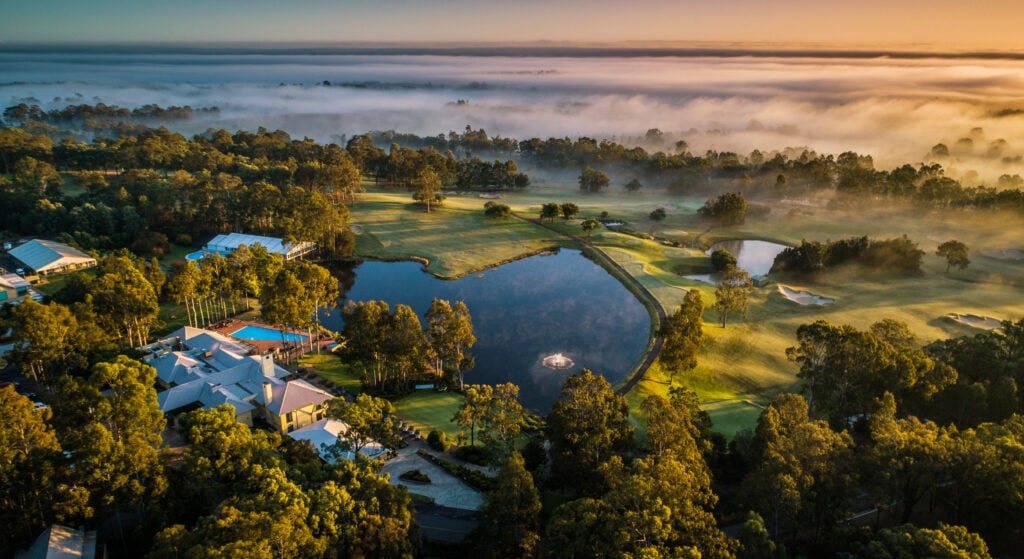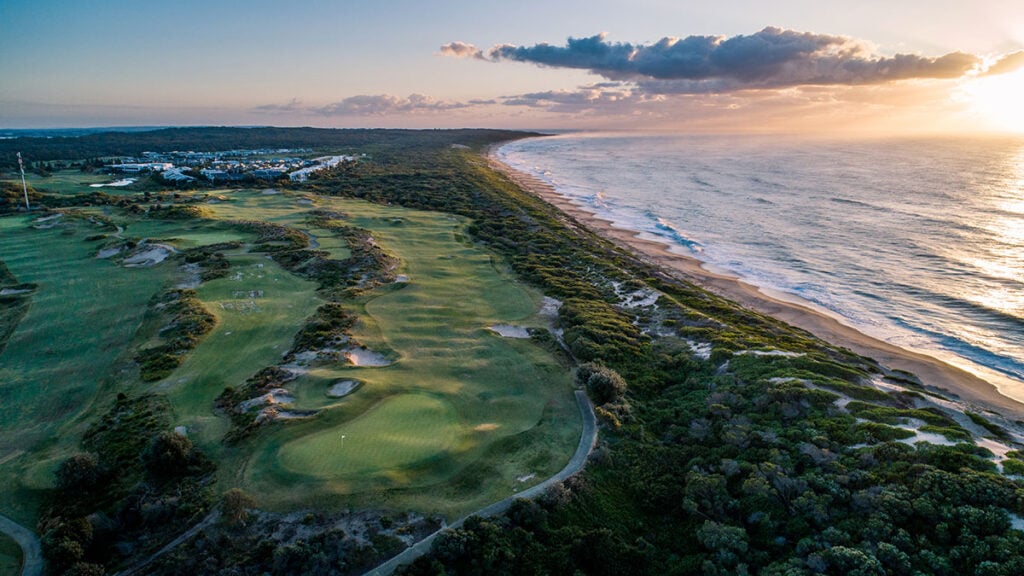We spoke with Alan Shipnuck as copies of LIV And Let Die hit bookshelves globally to hear an insider’s viewpoint on the most intriguing elements of the ongoing saga.
Australian Golf Digest: What was your greatest challenge in writing the book?
Alan Shipnuck: It was probably getting people to talk to me because everyone was suing everyone right off the bat. The LIV golfers sued the PGA Tour for antitrust. The tour turned around and counter-sued LIV for tortious interference and breach of contract and a bunch of other things. Patrick Reed was suing every golf writer on the beat, except for me, strangely. Jack Nicklaus sued himself. There was just a lot
going on.
And then of course, that first press conference in London, Graeme McDowell said a few things that created a firestorm – he told me he got death threats – and the other players saw how extreme the blowback could be. So it was a long process to get people to open up. Some would only do so under the cloak of anonymity, which wasn’t necessarily my first choice, but became a necessity just because some key people knew so much, but they had to protect themselves. Luckily, LIV has fired a lot of executives and they want to tell me stuff, but they had NDAs.
What we call the ‘five families’, the ruling bodies – the R&A, the PGA of America, the USGA, etc. – one of the heads of the five families came up to me and said, “Stop texting me because the Department of Justice is reading my text messages.” So there was a cloak-and-dagger element to the reporting, but that was part of the fun, honestly. As you know yourself, one of the joys of the job is chasing, and then when you can finally get someone to open up to you and give you what you need to really advance a story, that’s very satisfying. So I just had to be dogged and relentless in that regard.
▶ ▶ ▶

Is it true your management agreed to publishing the book before even consulting you?
I was flying home from the LIV London tournament, and of course I’d gotten bounced out of Phil [Mickelson]’s press conference, and Greg Norman was looming behind me like the Grim Reaper in that photo that some people have seen. It was a long flight back to the US and I was just reflecting on the energy of the story. And, honestly, no one knew what to expect out of LIV Golf. That first tournament, the build-out was really impressive. They did a great job with the infrastructure, the energy, the media attention. It’s like, Wow, this is a real thing. I think a lot of folks – possibly including myself – thought it might just blow away in the wind. But it was impressive.
And of course, during that tournament, they announced Bryson DeChambeau and Patrick Reed were going to sign, and those were huge signings because those guys were young and in their prime, and they had very long careers in front of them on the PGA Tour. They were potentially giving up a lot. Things really accelerated the week of London, so I wound up on the Wi-Fi, texting my long-time agent – a guy named David Black – and I said, “What do you think about a book about LIV Golf?” He’s like, “Oh, funny you’d mention that. Jofie [Ferrari-Adler, Shipnuck’s editor] and I had been talking about that…”
It was a total ambush. I mean, there’d been a little conversation, but it usually takes a long time to get a book deal done and the author has to write an outline and maybe a sample chapter, and a lot goes into it. But this was thrown together pretty quick. So it’s mostly true, I guess is the honest answer.
▶ ▶ ▶
LIV has a strong Australian element. What Australian-centric perspective do you have on it all now?
Well, it’s interesting. Part of LIV’s appeal is it’s rebellious. They’re raging against the establishment, they’re non-conformists. And, from what I’ve observed of the Aussie character, it seems like that dovetails nicely with the national self-image. And so certainly Norman’s involvement – he’s a very polarising figure in the golf world – but I think he’s still pretty beloved around Australia. So his involvement from the very beginning, I’m sure created more interest in Australia than almost anywhere else.
Cam Smith is a national hero and a huge ‘get’ for LIV Golf because, again, after that first wave of signings, it was like, Who’s going to be next? Are they going to be guys on the downside of their career, like the Martin Kaymers and the Graeme McDowells? But no, Cam Smith when he went to LIV was without question the best golfer on the planet. He’d won the crown jewel of the sport: an Open at St Andrew’s. And then, of course, Marc Leishman, who everybody loves. So it just so happens – and I’m sure the Norman connection is part of it – that LIV picked off some great golfers, some fun personalities and some beloved figures. So it makes sense that the Aussies have been tuned into it.
Then the premier of South Australia at the press conference in Adelaide talked about, “Hey, we do billions of dollars of business with Saudi Arabia. We send them tonnes of beef and barley and lamb…” He went through the whole thing. It seems that the Australians have a pragmatic approach to the relationship with Saudi Arabia as a trading partner, and it’s not as politicised or as an emotional issue there, as it certainly is in the United States. So a variety of factors really, but there’s no question that Australia has been crucial as a market and for sending players to LIV Golf.
▶ ▶ ▶

Do you think the PGA Tour now has an idea of the damage it’s done to smaller circuits, like the PGA Tour of Australasia?
I think the PGA Tour has some idea that it’s done damage to the PGA Tour of Australasia; I just don’t think they care. This era, these tour wars have shown how competitive it is and how Darwinian it is between the tours and how they’re competing for the scarcest resource of all, which are star golfers. There’s not many of them – there’s really not. There’s a lot of good golfers; there are not many stars. So the tour is doing everything it can – and not just in the LIV year, but over the past five, 10 years – to try to keep their best players to stay home and be loyal to what’s happening in the US.
I think the Australian Open is one of the five or six best tournaments on the entire planet, and it’s an absolute travesty it doesn’t get a better field. Royal Melbourne, it might be the best golf course in the world. Kingston Heath, incredible. I mean, you have the venues, you have the history, and that so many top players skip it – including even Australians like Jason Day, for instance – it’s an absolute shame.
The tour is a big reason why the way they’ve constructed the schedule, the wraparound season, has this sense that the players are playing 12 months a year now on the PGA Tour, and there’s no time to go down and support these events in Australia. So the people at the tour are clever enough to understand the damage they’re doing, but I think in their mind it’s just the cost of doing business.
▶ ▶ ▶
What is your take on Greg Norman’s role in LIV?
Well, he’s had the title and he’s been out front [but] he’s never had the power. It’s become clearer that Yasir is the guy who runs all of golf, essentially. But even his No.2 guy, Majed Al Sorour, he was Norman’s boss throughout the first year-plus of LIV Golf, and they were always butting heads (there’s some parts in the book about that relationship). I think Greg’s the emotional leader, but he doesn’t have the final say; he doesn’t control the chequebook. He sets the tone and has unbridled enthusiasm for the product and a willingness to mix it up with Jay Monahan and others publicly, sometimes to his own detriment.
Obviously he said the wrong thing a few times, but that rebellious streak, that renegade attitude that comes from Norman – there’s no doubt his star power and his charisma and charm helped get the Saudis into the fold. He gave them the whole movement, if you will, of a breakaway tour a lot of legitimacy. I mean, he’s a Hall of Famer, and he’s the guy who’s had this vision for a very long time.
Even though it’s felt over time like Norman’s been marginalised a little bit, and some of the documents that were released made it clear that Yasir was willing to sacrifice him for his larger objectives – which had to be disillusioning for Greg – I still think he’s an integral part of this. You can’t diminish his role even as much as the Tiger Woods’ and the Rory McIlroys of the world want to. LIV Golf probably doesn’t exist without Greg Norman’s advocacy and without his personality.
The players are very happy on LIV, and part of that is because Norman is the commissioner. Tim Finchem, who most of these guys played under for most of their careers, he was like this stern principal, always a rapping-them-on-the-knuckles-with-a-ruler kind of vibe, a very remote figure. Whereas Greg’s out there on the first tee giving handshakes and hugs, he’s on the driving range talking about swing theory. He gives guys advice in their business lives. He has their respect because he’s done it all in the game and he’s built his brand. So I think there’s a tremendous personal affection for Norman among the LIV guys because he’s changed their lives mostly for the better and he looks at things from the perspective of a player, not a bureaucrat, and they love that.
▶ ▶ ▶
What do you think is Greg’s end-game in all this?
Well, no matter what happens, he’s going to declare victory because even if this framework deal’s consummated and he gets essentially swept aside in the re-organisation, he’s going to say, “Listen, we changed golf. We did it. We gave the players the power. We gave them a voice. They were finally paid their market value.”
I’ve been told he has a giant ‘golden parachute’ waiting for him, so Greg’s going to be fine. I think if he says that he changed the game, I think that’s valid. He’s nurtured this vision for a long time. Certainly it’ll be a bitter pill for him if Jay Monahan winds up running global golf and he gets swept aside. That’s going to hurt on a personal level, but I do think his legacy will be as of this agent of change who touched off this whole re-organisation of the entire sport.
Now, if the framework agreement falls apart completely and/or Yasir just decides to keep LIV going as a parallel organisation, no matter what else is happening, then I think Greg will have a role at LIV Golf. Not always, but for as long as he wants it for the next few years as the commissioner, as the figurehead. But I think Yasir’s made it clear that his loyalty goes only so far and that he’s going to do what’s in the greater good or the interest of the Public Investment Fund and his very demanding boss. I think Greg is going to be OK. It might be a somewhat abrupt and slightly unhappy ending, but he’s gotten it this far and he’s going to claim a lot of credit, and I think that’s valid.
▶ ▶ ▶

There’s a tangible link between your previous book, Phil, and this one. What’s your take on Mickelson in light of LIV And Let Die?
He is such a s–t-stirrer! He’s just in the middle of everything. It’s incredible. I learned a lot in reporting this book about his role. I didn’t realise how intertwined he was at the Premier Golf League, and the second that became not a viable concept, he went right to the Saudis – switched allegiances. But this idea that he took all the intellectual property, went to some money guys in New York at Silver Lake, a private equity firm, and tried to create his own breakaway. He was basically working three sides of the street, more or less simultaneously with the Premier Golf League, the Saudis and then his own breakaway circuit. Meanwhile, he was still negotiating with the PGA Tour in case he stayed, and he was trying to feather his nest there.
It’s just unbelievable. The has got his thumb in every pot of soup you can imagine. You almost have to tip your cap to him. He’s maniacal in this lust for power, for influence, for money, for validation. It’s just incredible. I definitely learned more how enmeshed he was. Picking up the phone and calling Keith Pelley and advocating for the PGL, pushing back on how much Tiger was going to get paid by the PGL – it’s just hilarious.
I didn’t want to put too much Mickelson in this book. I didn’t want it to feel like a sequel, but he makes some hilarious cameos in the telling because he’s just such a muckraker and he’s always stirring up trouble, which I say that with some affection and some, well, gratitude, because he’s made this whole story so much more interesting.
▶ ▶ ▶

Has golf gone ‘woke’?
I haven’t thought about that. In regard to the killing of Jamal Khashoggi and the objections to Saudi money, I don’t think that counts as woke. I think it’s a valid concern across the entire political spectrum, really. It’s just a fact that 15 of the 19 9/11 hijackers were from Saudi Arabia, and more and more evidence has emerged that they were materially supported by government agents. It’s always going to be an emotional issue for Americans, whether they’re Democrats or Republicans. Jamal Khashoggi was a resident of the United States working for the Washington Post, a very proud institution here, so there’s always going to be anger and bitterness at his assassination.
I think these are valid concerns, and I think it’s fair game to bring them up in the context of LIV Golf. I don’t think it’s an issue of being woke. It’s probably still a conservative sport and most of the players are right-leaning, politically.
▶ ▶ ▶
Some of the most notable voices in the global golf media – Brandel Chamblee, Eamon Lynch, Geoff Shackelford, etc. – have gone well beyond mere reportage and become highly opinionated and anti-LIV. Do you get the sense they’ve now realised they’ve ‘backed the wrong horse’ in all this?
It’s interesting. I don’t begrudge reporters, columnists. Brandel, he’s paid to give opinions. So is Geoff Shackelford. So is Eamon Lynch, really. They’re not traditional reporters. They’re commentators, they’re pundits. I think it’s fine for them to express a strong opinion. I guess what’s been interesting to me is that a lot of – not those three in particular – but I’m pretty sure Brandel and Eamon have never been to a LIV event. ‘Shack’ has maybe gone to one or two, but reporters I respect have said, “I’m just not interested.” They don’t really want to.
This is the biggest golf story of the century, Non-Tiger Woods Division, and whatever feelings you may have to just dismiss it out of hand and not go and experience it and not treat it as this powerful force in the game… that was very quizzical to me. I do think on some level, that’s a dereliction of duty. Our job is to explain things to fans, to bring insight, to bring context, fresh reporting, put them in the room where it happened. That’s why I try to do in this book. So much of the story happened in the shadows, and so I try to give people an understanding of how we got to this crazy moment in the game. That was only possible by me going to a bunch of LIV events, talking to players and executives and caddies and wives, and really drilling down on the culture out there.
I think Brandel’s an idealist, just like Rory McIlroy. I think they both got their hearts ripped out of their chest. The money guys came in and they cut a deal, and it turned out that Saudi money wasn’t so bad if they could get their hands on it. I think there’s some disillusionment. There’s some disenchantment. Brandel, to his credit, the day the framework agreement was announced, he went on the air and he stuck to his guns, he’s never backed off an inch. But it had to have been painful to see this very strong stance he’d taken undermined by Jay Monahan, Jimmy Dunne and these other guys who, after demonising the Saudis for so long, realise, You know what? We actually need them. It’s been enlightening.
▶ ▶ ▶

Based on your research and what you’ve seen these past few years, how does all this play out from here? Can you forecast how it ends with LIV and the PGA Tour?
Some people have said, “How can you put the book out now? We don’t know how the story ends.” Well, we do. The framework agreement’s going to get consummated as is, it’s going to blow up entirely or there’s this middle ground that’s emerging where some US-based money comes in. It could be private equity from New York, it could be venture capital from Silicon Valley, it could be Hollywood money, and they invest alongside the Saudis. That’s obviously very attractive for the PGA Tour because it dilutes the Saudi influence, makes it easier to sell this deal to players, fans and, importantly, United States Congress. They’ve been scrutinising this heavily. You might say, “Oh yeah, the Saudis are investors but
so are these two other giant, respected US-based firms.” You can see why the tour is entertaining these bids and why they’re excited about it.
The real question is, what does Yasir want? Because the PIF likes to be in a position of dominance in any deal. That’s just how they do it. They’re not usually a small, minority investor. Monahan and the tour are playing with fire because if you scare off Yasir and they pull their money out, the tour can still re-organise itself, it can still be better capitalised, it can still get the $2 billion to invest in its product and to pay the players what they promised because that’s really what’s been driving this – that Jay Monahan wrote a bunch of cheques he can’t cash. The tour’s running out of money, so they need the investment, whether it’s from the Saudis or somebody else. But if the Saudis pull out, then LIV goes back to being a fierce competitor, and Yasir still has a chequebook and now he’s p—ed off and things can get really interesting as far as rating talent. That’s a legit concern.
Again, as I mentioned earlier, even if the Public Investment Fund is part of this new world order in golf and they create this new for-profit entity, that does not signal the end of LIV Golf. Everything we’ve heard and read since June is that Yasir’s committed to it. He’s told all the players and it’s his baby. And I’ve been saying since June 6 that LIV is not going to go away. Yasir is just too committed to it. Those players bought into his vision; they validated it. He put his reputation on the line, and therefore the reputation of the Crown Prince of Saudi Arabia, who is in fact a scary motherf–ker, and those players made it work on some level.
He also has absolute dominion over LIV Golf in a way that even if they’re an investor in the NewCo, he’s not going to be able to control the schedule. He’s not going to have that much influence on the day-to-day. But Yasir can control the LIV Golf schedule and he can use it for whatever purposes he wants – to colonise new markets for Saudi Arabia, to bring more tournaments to Saudi Arabia, to help grow certain tourism sectors, new resorts. So it has a lot of utility.
The only way the Public Investment Fund can get its money back is if they sell the franchises and the longer LIV is in business, the better chance they have of selling them and creating some real revenue and some real interest. I think there’s going to be LIV Golf in 2024. I think there’ll be LIV Golf in 2025. Beyond that, we just don’t know exactly what professional golf’s going to look like, but I think Yasir loves it. I think it’s important to him in a personal level and on a professional level. LIV Golf is on pretty firm footing. That’s my take on it.



